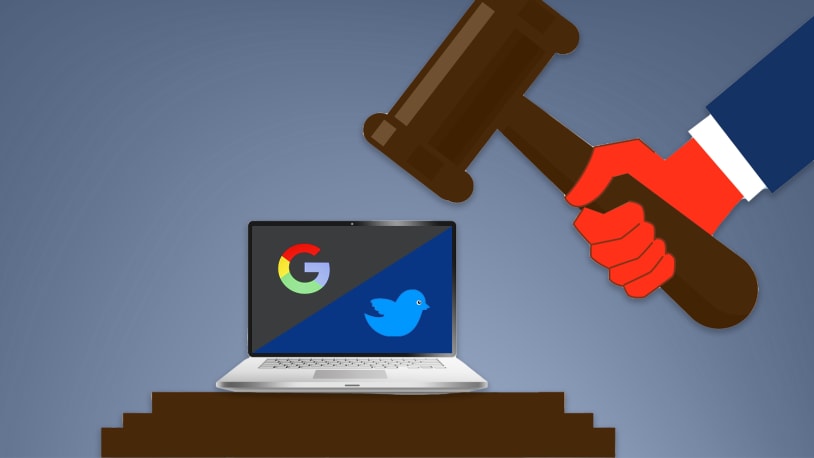
The Supreme Court cases that could ‘wreak havoc’ on the internet
The Supreme Court is hearing landmark cases involving a law that has thus far shielded internet companies, like Google and Twitter, from being liable for the content posted by their users. Could the outcomes upend the internet as we know it?
What is Section 230?
At the center of both Gonzalez v. Google and Twitter v. Taamneh is the controversial Section 230 of the Communications Decency Act, “a nearly 30-year-old federal law that courts have repeatedly said provides broad protections to tech platforms,” Brian Fung writes for CNN. Section 230 shields internet service providers from any liability for content posted by a third party. Both Republicans and Democrats have scrutinized the law in recent years, though for different reasons. Lawmakers on the right alleged that Section 230 gave “social media platforms a license to censor conservative viewpoints,” Fung says. At the same time, the left argues the law “prevents tech giants from being held accountable for spreading misinformation and hate speech.”
In an interview Nitsana Darshan-Leitner, a lawyer representing the plaintiffs in the Google case, called the hotly debated law “a shield that nobody was able to break,” The Washington Post reports. “It gave the social media companies the belief that they’re untouchable.”
What is happening in the cases?
The Supreme Court began hearing oral arguments Tuesday in Gonzalez v. Google, which “zeroes in on whether [Google] can be sued because of its subsidiary YouTube’s algorithmic promotion of terrorist videos on its platform,” Fung explains. The plaintiffs in the case are the family of Nohemi Gonzalez, who was killed in a 2015 ISIS attack in Paris. Their lawyers argue that YouTube’s recommendations “violated a U.S. antiterrorism law by helping to radicalize viewers and promote ISIS’s worldview.” Google claims that Section 230 protects it from being held liable for the videos circulated by its recommendation algorithms.
The second case, Twitter v. Taamneh, is related to an ISIS attack in Istanbul in 2017. Family members of Nawras Alassaf allege that social media platforms, including Twitter, knowingly aided and abetted ISIS in the act of terrorism by allowing the group’s content to remain on their platforms.
The difference between the two cases is that while the Twitter case seeks to determine “liability merely for hosting content without malicious intent,” as the ACLU writes, the Google case asks whether Section 230 applies to amplified content, focusing on what the company’s algorithms and policies allow to be suggested to users. The judges could find that while “a provider would remain immunized for merely hosting content, it would be responsible for highlighting it,” says the ACLU.
The Twitter case in particular could decide “whether the companies could be liable under antiterrorism laws such as the Anti-Terrorism Act and its 2016 amendments, the Justice Against Sponsors of Terrorism Act,” The Wall Street Journal explains. Final decisions in both cases are expected before July.
After three hours of questioning in the first case, the Journal says, the justices “reacted skeptically” to the plaintiff’s assertion that YouTube’s parent company should be held responsible for the extremist videos recommended by its algorithm. Justices seemed worried that narrowing the scope of Section 230 would lead to “a wave of lawsuits and disruption to the internet,” CNN writes.
“You are creating a world of lawsuits,” said Justice Elena Kagan. “Really, anytime you have content, you also have these presentational and prioritization choices that can be subject to suit.”
How could the outcomes shape the future of the internet?
Google and its allies in the tech industry say that a win for the plaintiffs “could wreak havoc on the internet,” The Associated Press says. Yelp, Reddit, Microsoft, Craigslist, Twitter, and Facebook are among the companies that have submitted friend-of-the-court filings “warning that searches for jobs, restaurants, and merchandise could be restricted if those social media platforms had to worry about being sued over the recommendations they provide and their users want.”
“Section 230 underpins a lot of aspects of the open internet,” said Neal Mohan, the recently-appointed senior vice president and head of YouTube.
The Supreme Court is hearing landmark cases involving a law that has thus far shielded internet companies, like Google and Twitter, from being liable for the content posted by their users. Could the outcomes upend the internet as we know it? What is Section 230? At the center of both Gonzalez v. Google and Twitter v. Taamneh…
The Supreme Court is hearing landmark cases involving a law that has thus far shielded internet companies, like Google and Twitter, from being liable for the content posted by their users. Could the outcomes upend the internet as we know it? What is Section 230? At the center of both Gonzalez v. Google and Twitter v. Taamneh…